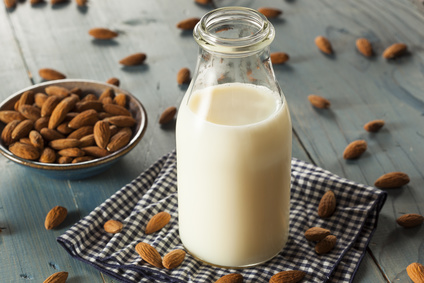A Word About Diary
Published: Wed, 11/04/15
A Word About Dairy David Christopher, M.H.
Milk is the perfect food for babies. The breast provides specific nutrients for a developing baby and employs passive immunity. All immunity that the mother possesses is passed on to her child while the child’s immune system develops. Milk from another species only provides immunity to those diseases to which that species is subjected and provides no immunity to human diseases. Soy and other plant sources provide no immunity. Human babies need to be nursed by human mothers to achieve this immunity. Babies are naturally vaccinated through nursing.

Milk provides protein in the form of casein. This casein is broken down by renin which the baby produces as long as nursing continues. When a baby is weaned the renin is not produced and hence the casein cannot be broken down. Protein that has not broken down is subjected to bacterial action which causes intestinal distress. In later life many diseases are linked to this failure to break down casein. Casein is found in all dairy products, including traces in butter.
Milk provides needed carbohydrates in the form of the disaccharide lactose. The two sugars in lactose are glucose, which can be immediately used when separated, and galactose. Glucose is released by the enzyme lactase which is produced by the baby. Then galactose is converted to glucose by another enzyme, beta galactosidase, which is also produced by the baby. These enzymes are not produced after weaning. (Note exception below)
In all mammals the ability to break down the proteins and sugars in milk is lost. This natural order perhaps prevents the enslavement of the female species to a lifetime of lactating.
The exception to lactase production occurred anciently in snow and desert dwellers. With no vegetation available, milk was extracted from domesticated animals and employed in the diet. Although this milk invariably caused intestinal distress, it kept them from starving. These ancient people consistently consumed milk and consequently mutated and started producing lactase after weaning. All other inhabitants of the world are lactose intolerant.
Beta galactosidase, the other enzyme in milk, which converts galactose to the useable glucose is lost after nursing in all species of animals including Northern Europeans. This unbroken-down sugar is difficult to eliminate. It is trapped in mucus for elimination and is linked to many health concerns, (read Robert Cohens MILK A-Z), including cancers, especially prostate and ovarian cancers.
Dr. Christopher observed in his practices, especially during his time in the army in World War II, that many diseases were caused by mucus congestion and easily remedied by removing dairy from the diet of these soldiers and patients.
Putting all of this aside, the main reason people drink milk is for the calcium- which isn’t even bio-available. Perhaps because of the indigestibility inherent in milk the calcium is not assimilated into our bodies. The fact is that only 25% of the calcium is assimilated and that is measurably eliminated in the urine. Then we consider that one of the purposes of consuming milk is to harden the soft pliable bones in babies that allow them to pass through the birth canal. If we
keep drinking milk, which hardens bones after weaning, then we must ask, “What is beyond hard?” The answer is brittle. If we keep drinking milk and keep hardening our bones, then our bones will become brittle. Perhaps that is why observant practitioners have noted that broken bones do not heal quickly when their clients are drinking large quantities of milk.
For complete treatise on this subject may we suggest searching both sides of the issue including any of Robert Cohen’s books on milk.
Printable Version: http://www.herballegacy.com/
If you missed an article be sure to visit http://www.herballegacy.com and click on Articles. Also, take advantage of David Christopher's Radio Show (see Resource Links below for more information).
There are many delicious options for replacing cow's milk. Below you will find just a few. These are delicious, high in vitamins and minerals and the oat and rice milk are extremely inexpensive to make. These work wonderfully in smoothies, soups and to replace cow milk in other recipes. Enjoy!
Almond Milk
1 cup almonds - soaked in pure water for at least 8 hours.

3 cups water
After soaking the almonds for at least 8 hours, drain and rinse. Add the almonds and water to a high speed blender and blend for 2-3 minutes. Strain the milk through a nut milk bag. You can add 1 Tablespoon of honey if you desire sweeter milk. The pulp from the almond milk can be dehydrated and used in place of almond meal and almond flour or it can be used in its moist state to make crackers and raw breads.
Oat Milk or Rice Milk
1 cup steel cut oats OR 1 cup brown rice soaked in pure water for at least 8 hours
4 cups water
After soaking the oats OR rice, drain and rinse. Add the 4 cups water to the blender and blend for 2-4 minutes. Strain through a nut milk bag. You can add 1 Tablespoon of honey if you desire sweeter milk.
Recipe by Tonya Judd
Herbal Resource Links
- Herbal Legacy - http://www.herballegacy.com - Our free information website
- The School of Natural Healing - http://www.snh.cc - Quality Education since 1953
- Christopher Publications - http://www.christopherpublications.com - Dr. Christopher's books and more
- Christopher Websites - http://www.christopherwebsites.com - Find all Christopher websites and other great resources
- A Healthier You Radio Show - http://www.ahealthieryouradio.com - Free weekly radio show
The School of Natural Healing: http://www.snh.cc
Christopher Publications: http://www.christopherpublications.com
NOTICE: All information in this newsletter is given out as information only and is not intended to diagnose or prescribe. For our official Disclaimer, Biological Individuality, Important Notice & Terms of Use please see: http://www.herballegacy.com/Disclaimer.html
This newsletter is sent by permission only - you can unsubscribe quickly and easily by clicking the link below.
.

